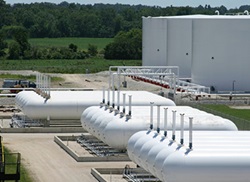Refineries and Storage

Refineries
The refining process seeks to extract maximum value from the resources within the system. Refineries incorporate extensive drainage and water treatment systems that are integral to both environmental protection and the efficient use of petroleum resources. Most refineries also have associated marine terminals, transfer stations, and storage facilities equipped with a range of spill-prevention technologies.
Gravity Oil/Water Separators
Gravity oil/water separators are the primary means of recovering any oil spilled within the refinery system. These simple, yet highly effective devices collect oiled wastewater in a tank. Because oil is generally lighter than water, it will separate and float to the surface once in the tank. It is then directed out of the tank through an outflow pipe while the clean water is collected for removal through a separate outflow pipe.
Overfill Sensors
Overfill sensors are attached inside the roof of a storage or transfer tank and identify when the desired level of petroleum product has been achieved within the tank, triggering an automatic shut-off valve to prevent overfilling.
Self-Adjusting Cargo Connections
Self-adjusting cargo connections at marine terminals prevent spills by compensating for the movement of the ship on the water. The connector arms can swing both vertically and horizontally, eliminating any potential stress to the connection point.
Storage Terminals
Oil and refined petroleum products are stored in tanks at various points on the journey from well to consumer. For example, products are stored at marine terminals where tankers offload their cargo or at refineries, where finished products await distribution by truck, rail, or pipeline. Specially designed equipment and a variety of sophisticated sensors help to prevent or, in the event of an accidental release, contain spills.
Overfill sensors
Overfill sensors are attached inside the roof of a storage or transfer tank and identify when the desired level of petroleum product has been achieved within the tank, triggering an automatic shut-off valve to prevent overfilling.
Metered pumps
Metered pumps are programmed to deliver a pre-set amount of petroleum product from a storage facility to a tanker truck or train car, providing a safeguard against accidental overfilling. The operator monitors the transfer and can utilize a manual shut-off-valve to stop the loading, if necessary.
Self-Adjusting Cargo Connections
Self-adjusting cargo connections at marine terminals prevent spills by compensating for the movement of the ship on the water. The connector arms can swing both vertically and horizontally, eliminating potential stress on the connection point.
Concrete Trap
Concrete traps are constructed beneath above-ground tanks to protect against groundwater contamination and facilitate the rapid identification of a spill in the unlikely event of structural failure. A circular, gravel-filled trough collects any spilled product.

